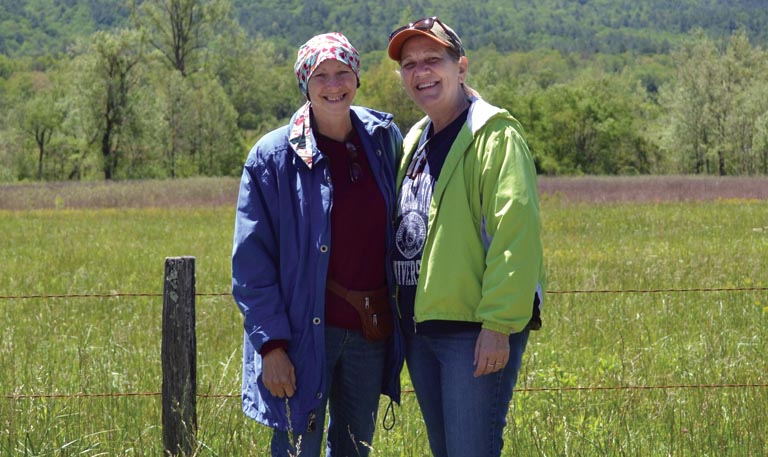Granddaddy taught me how to drive when I was only 12 years old. With a belly full of butterflies, I’d slide into the driver’s seat and stretch tall to see over the steering wheel. “You only need to remember one thing to be a good driver,” he’d say at every lesson. “Pay attention.”
Decades later, when the oncologist tenderly announced Jamie’s stage IV metastatic breast cancer, we couldn’t crane our necks high enough to see the road ahead. For an interminably long period of time, which passed in a blink, we fought the battle inch by inch every moment of the day. It was all we did in the beginning.
While logic might dictate this approach, we soon realized that navigating this journey required something more. We talked with new friends in the cancer battle; researched and searched ourselves for a strategy; and finally landed upon a tiny bit of wisdom from my childhood driving lessons.
To pay attention, we would lay claim to a minute, an hour, a day, and more—with all of our senses.
In an unexpectedly liberating way, the circumstances of this illness soon rendered us “able, perhaps for the first time in years, to look round, to look up—to look, for example, at the sky,” as Virginia Woolf wrote in her essay, “On Being Ill.” Now, rather than drive on autopilot, we’d stop for a sunset, a view of the mountains, cloud formations, fruit-bearing trees, and fields of corn combed into rows. We tracked the seasons by the landscapes rather than the calendar. And, hundreds of doctors’ appointments gave us the opportunities.
Then Jamie brought nature’s cycles inside with small herb gardens, starting flowers from seed. This expanded to reading magazines on the topic, visiting farms and markets, cooking in-season dishes with new recipes, and canning, drying, and freezing local produce. We made it a goal to support as many small business eateries as possible, and sometimes we’d just order dessert!
As partner and caregiver, the world suddenly looked different from behind my eyes as well. “Now, lying recumbent, staring straight up, the sky is discovered to be something so different, that really it is a little shocking. This then has been going on all the time without our knowing it!” Woolf wrote. “This incessant making up of shapes and casting them down, this buffeting of clouds together, this incessant ringing up and down of curtains of light and shade, this interminable experiment with gold shafts and blue shadows, with veiling the sun and unveiling it…”
It became our conscious challenge to find a myriad of ways to experience the world. We re-watched favorite movies; read aloud to each other; turned up the volume way too high on the oldies music channels; and laughed out loud at reruns of classic Britcoms. The treasure hunt was on at resale bookshops for favorite authors, and any book signing within 100 miles was fair game. Going to the movie theater for new release matinees and popcorn felt like more than the sum of its parts. In these activities the ordinary became extraordinary.
Thank you, granddaddy, for so much more than a driving lesson. When we pay attention, time layers upon itself, giving us much more than the tick of a clock. In the words of poet Rainer Maria Rilke: “Death is our friend precisely because it brings us into absolute and passionate presence with all that is here, that is natural, that is love… Life always says Yes and No simultaneously. Death (I implore you to believe) is the true Yea-sayer. It stands before eternity and says only: Yes.”
While I must now speak for both of us, I’m certain Jamie would quietly say that our art of living after diagnosis was simply to “pay attention.”
Angela Minor has lived, traveled, and birded the U.S., Caribbean, and seven European countries. A former teacher and small business owner, she writes for travel publications including Blue Ridge Country, Smoky Mountain Living, and Ft. Myers Magazine; serves as field editor with Birds & Blooms and as “Park Watch” Beat Writer for 10,000 Birds; and authors the Bird Watcher’s Digest state park birding series.


